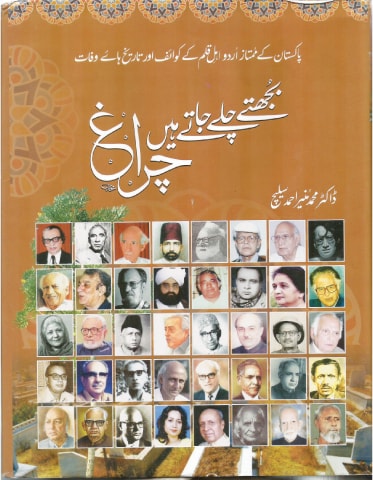
MANY of the reference works done in the West are simply amazing and leave one longing for the same sort of works in Pakistan and in Urdu. One such monumental work is The Dictionary of National Biography, usually referred to as DNB.
DNB is an authentic work recording the lives of some 60,000 deceased notables from the United Kingdom and its colonies. Starting in 1884, with the passage of time the dictionary swelled to 63 volumes. Six supplementary volumes too had to be published. It was revised from time to time and considering the modern perspective some articles’ length was reduced, though no article from the original was totally axed. Shorter versions too were published. Later, Oxford University Press was entrusted with the project and in 2004 Oxford Dictionary of National Biography (ODNB) was published in 60 volumes. In addition to a print edition, it is available online, too. Though electronic version is not for free, the earlier version is available for free online. DNB records the lives of those many of whom were, as put by ODNB, “... significant, influential or notorious figures who shaped British history”.
But recording the biographical details is not something new to Muslims. In fact, it was Muslims who began recording the lives of certain personalities in a systematic and scientific way. Some researchers of Hadith of Prophet Muhammad (PBUH) devoted their lives to preparing a database of persons who were in anyway related to narration of Hadith. Finally, a new branch of knowledge, known as ‘Asm-ur-rijaal’, was founded, recording the biographies of over half a million persons.
Similarly, necrology, which means, according to Merriam-Webster Dictionary, obituary or a list of the recently dead, dates to 9th century. In 890, Yaqoob Bin Sufyan wrote a book in Arabic, recording the dates of deaths with brief biographical sketches of some figures. In 1375, Faseehi Khwafi wrote a book in Persian, recording some historical events as well as obituaries. In the subcontinent, obituaries or biographical accounts of poets were penned under the title of Tazkirah. These ‘tazkirahs’ were both in Persian and Urdu.
Among the latter-day scholars of Urdu who reinvigorated the art of ‘vifiyaat’, or obituary, were Syed Sulaiman Nadvi and Abdul Majid Daryabadi. Others who richly contributed to obituary writing in Urdu are Malik Ram, Prof Muhammad Aslam, Zahid Hussain Anjum, M.R. Shahid and some others. In recent years, however, Dr Muhammad Muneer Sletch has surpassed almost all of them.
Dr Muhammad Muneer Ahmed Sletch is a strange fellow. Some of his friends jokingly say that he loves the dead more than the living because Dr Sletch records obituaries with an undying passion. Some make fun of his hobby of collecting obituaries by calling it ‘digging up the dead’. In his books, Sletch, a medical
doctor, has so far recorded the obituaries of some 17,000 Pakistanis, which is a record in itself and indeed shows his love for the departed souls.
But in all seriousness and fairness, Sletch has carried out a monumental research on the obituaries of notable Pakistanis and especially Pakistani writers, journalists, scholars and poets who departed this mortal world for their heavenly during the last 70 years.
In the past, Sletch’s minute and back-breaking research had resulted in four books, recording the deaths of notable country fellows. First it was Khuftagaan-i-khaake-Gujrat (1996), in which Seltch gave the obituaries of about 300 personalities belonging to his native Gujrat, Punjab. Then in 2006, he came up with a gigantic work, Vafiyaat-i-naamvaraan-i-Pakistan, a book enlisting obituaries of over 8,000 notable Pakistanis from different fields who had died between Aug 14, 1947 and Dec 31, 2004. His book Vafiyaat-i-ahle-qalam (2008) covered the obituaries of Pakistani writers who had departed between the Independence Day in 1947, and Aug 14, 2007.
Sletch’s work Tanhaiyyaan bolti hain is a collection of about 500 Pakistanis who had died till Dec 31, 2011 and were buried in Islamabad. This one included some brief articles as well, giving the biographical details.
And his latest is Bujhte chale jate hain chiragh, a book recording the obituaries of Pakistan’s Urdu writers who had died till August 14, 2017. It includes deceased Pakistani writers who lived abroad as well as many names of prominent Pakistani writers of Urdu from former East Pakistan, until it became Bangladesh in 1971. This latest work has some 3,000 entries and it adds some 1,200 new names. This is a sort of Pakistani biographical dictionary of writers, giving a record of the past 70 years.
A lot of support, funding and planning must have gone into the famous DNB. But Muneer Sletch has created a ‘Pakistani Dictionary of National Biography’ single-handedly, on his own and without much appreciation. At least libraries and government departments should buy this book, published by Lahore’s Qalam Foundation. Their email address is: qalamfoundation3@gmail.com. They can also be reached on phone and the number is: 0323-4393422.
Published in Dawn, June 11th, 2018















































Dear visitor, the comments section is undergoing an overhaul and will return soon.